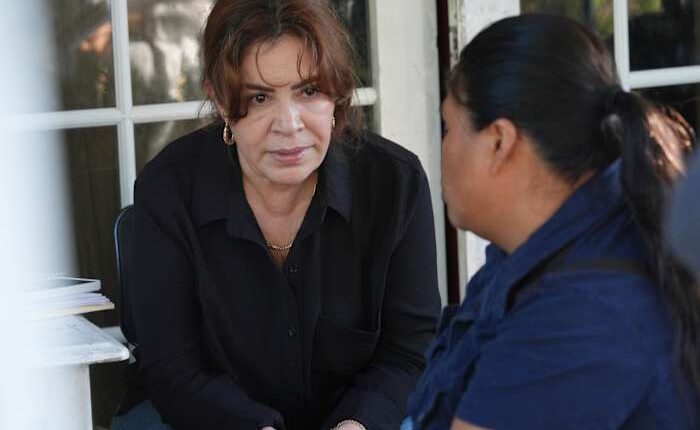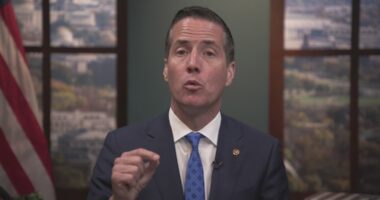
In Homestead, Fla., a dozen immigrant families gathered at Nora Sandigo’s ranch the day before President Donald Trump’s inauguration. They sought her assistance in becoming legal guardians of their children. Now, they are urging Sandigo to visit their homes to finalize the necessary paperwork.
Immigrants living in the U.S. without legal status have altered their behavior due to the fear of potential Immigration and Customs Enforcement (ICE) operations. Many are limiting their movements, avoiding interactions with advocates like Sandigo. Trump’s anti-immigration rhetoric and policy changes, including the termination of certain programs, have fueled these concerns.
Over the past weeks, Sandigo has been inundated with calls from immigrant parents nationwide. She has visited around 15 homes where parents have completed paperwork for Sandigo to act on behalf of their children in various institutions such as schools, hospitals, and courts in case of deportation. This legal arrangement also enables her to facilitate reuniting the children with their families.
“Now people are telling us that they are afraid to go out on the street, that they are afraid to drive, that they are afraid that they will stop them on the street,” said Sandigo, a 59-year-old mother of two daughters who lives in Homestead, a city of about 80,000 people south of Miami. “They have asked me to go to where they are instead of them coming to me.”
Immigration arrests under Trump
The White House has said over 8,000 immigrants who were in the country illegally have been arrested since Trump’s inauguration on Jan. 20. ICE averaged 787 arrests a day from Jan. 23 to Jan. 31, compared with a daily average of 311 during a 12-month period that ended Sept. 30 during the Biden administration. ICE has stopped publishing daily arrest totals.
In Homestead, where many immigrants from Mexico and Central America live and work in nurseries and fruit and vegetable fields, some avoid the supermarkets and instead ask neighbors to do their grocery shopping. In front of stores like Home Depot, men no longer stand around looking for work. Others have even stopped going to Sacred Heart Church on Sundays.
“People have stopped coming, and when they come, they ask if the immigration officials came here,” said Elisaul Velazco, the owner of a clothing store downtown. “Everything is paralyzed. Sales have dropped by 60%.”
Parents fear their children will be taken from them
For years, Sandigo has prepared immigrant parents for the worst-case scenario: being separated from their children.
Now she goes to those parents instead of having them come to her.
One recent Sunday, she visited four houses and received documents involving over 20 children. In some cases, the children were born in the U.S. and are citizens. The documents do not provide her full legal guardianship or transfer parental rights, but simply allow Sandigo to make decisions on their behalf.
Most parents fear if they do not name a legal guardian, their children will enter the foster care system, they will lose their parental rights and someone else will adopt their children.
Visiting immigrant parents’ homes
Julia, a 36-year-old Guatemalan woman who insisted she be identified only by her first name out of fear of deportation, waited a few minutes before opening the door for Sandigo as a group of people ran out the back door.
“It’s me, Nora, the lady you phoned to come,” Sandigo told her.
Julia opened the door a crack, saw Sandigo and then came out. Julia explained her husband had been detained days earlier while in a van with other immigrants on their way to a construction job.
After a brief conversation, Julia invited Sandigo, a notary and a volunteer into her small house.
Julia recalled that eight years ago her first husband, also Guatemalan, was deported, leaving her behind with their two American children, now 18 and 11 years old.
“We are afraid. I feel very sad with life because of what I am going through,” said Julia, her voice breaking and her eyes getting watery.
The notary asked Julia to show her daughter’s birth certificate and explained the son is an adult and doesn’t need a guardian.
“I don’t want my children to be taken away from me. If something happens to me, I want them with me,” she said before signing the power of attorney naming Sandigo as the legal guardian of the youngest.
In the backyard of another home, Albertina, a 36-year-old Mexican mother, held her 2-month-old baby while explaining what she wants for her six children if she is deported. Albertina also insisted only her first name be used.
“I am very afraid that they will grab me on the road and take me away. What’s going to happen to them?” she said of her children.
She asked Sandigo to take care of her two oldest daughters, 15 and 17, because they do not want to go to Mexico, while Sandigo should send the other four to her home country.
Sandigo has been a guardian for 2,000 children
Sandigo relates to the families she helps. A devout Catholic, she fled Nicaragua when she was 16, leaving behind her parents after the Sandinista government confiscated her family’s farm. She is now a U.S. citizen.
About 15 years ago, she began offering to be a legal guardian to immigrant children. About 22 children of deported parents have lived in her house temporarily since then. More than 2,000 children have been under her guardianship, although some are now adults. Sandigo said she has assisted hundreds of those children.
“I feel empathy for them, solidarity, love for God. I want to do something,” she said.
Copyright 2025 The Associated Press. All rights reserved. This material may not be published, broadcast, rewritten or redistributed without permission.

















